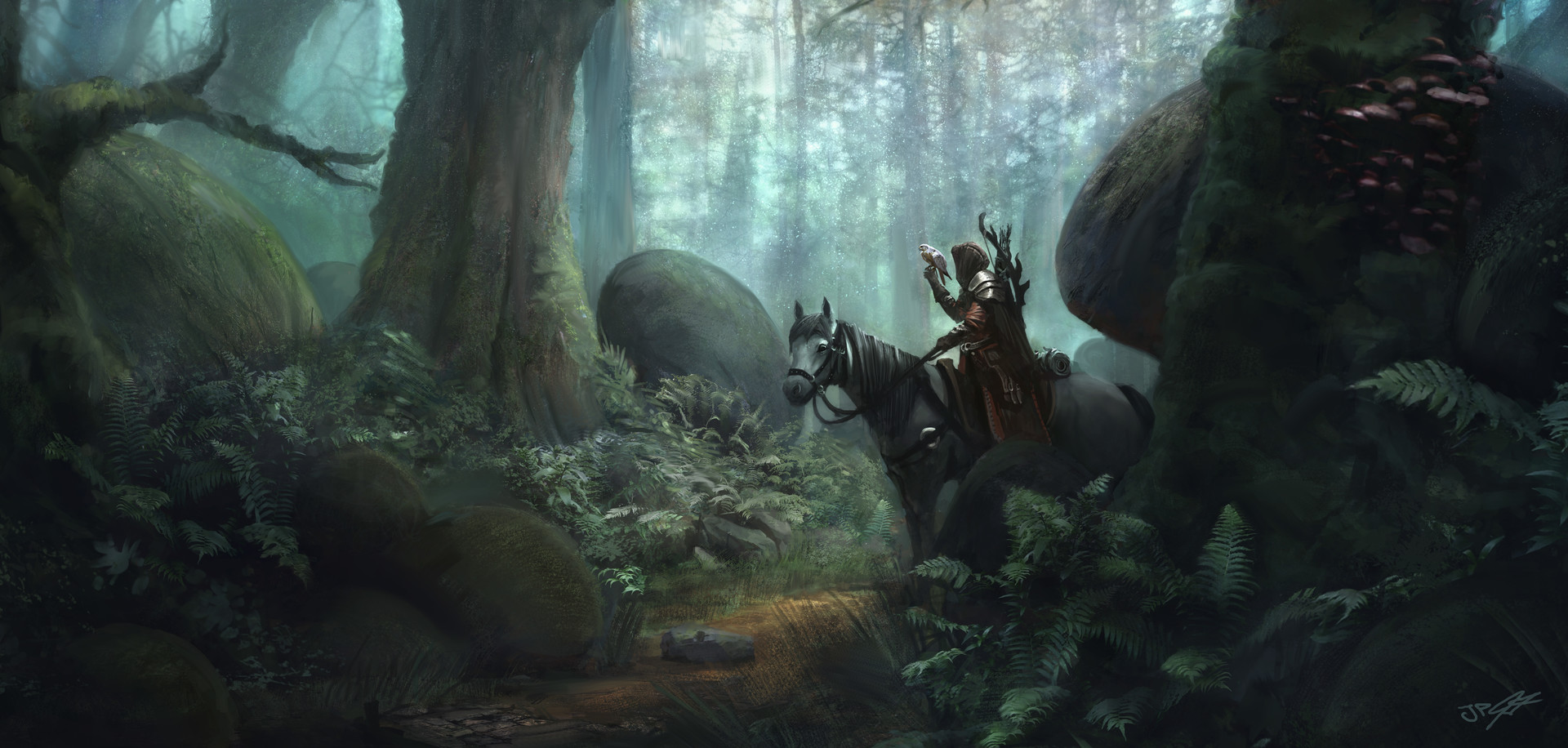The Versatile Ranger
Moving stealthily, a lone human stalks a deep forest, following the massive tracks of a creature he's hunting. He hears a low growl and in one swift motion, he's hidden behind a tree and has nocked his hunting bow.
A wolf fights alongside a drow elf against a massive, club-wielding giant. The pair act as one, using the other's attacks as openings for their own, and together they overwhelm their opponent in a flurry of blade and fangs.
A tiefling stands in a dark clearing over a werewolf's corpse and wipes blood off a silvered blade. A dozen howls echo through the forest as the tiefling sheathes her blade and enters the moonlit wood once again.
A ranger's work is never over. There is always another prey in need of hunting.
Fearsome Predators
Deadly hunters, rangers have honed their abilities for tracking down and eliminating their prey. As with any able predator, rangers specialize in outwitting and outlasting their targets.
Rangers employ deadly martial prowess augmented with adaptive magical skill in order to succeed on their hunts.
Rangers specialize in mobility, stealth, and tracking their marks. Once a ranger sets their sights on an enemy, they use all their might and cunning to secure the kill.
Adaptive Survivalists
In order to hunt their quarry, rangers learn techniques to thrive in dangerous territories. They may spend weeks in the fringes of civilization, deep in the harsh wilderness, or even hidden in enemy territories.
As such, rangers have the knack for adapting to threats when the situation calls for it. They have the skills to survive in most environments and have the ability to help others survive in the wilds as well.
Design Highlights (v3.7.0)
- Balance and simplicity are primary design goals, as well as observing 5th Edition's design philosophies.
- Design focus is on giving identity to the ranger as a hunter; not by giving the class more damage, but instead a focus on adaptability, mobility, stealth, and perception - things a ranger should be good at!
- Prepared spellcasting instead of learned spells.
- Rather than choosing a favored enemy, you choose a subclass based on what your ranger hunts.
- Completely rebuilt Beast Conclave subclass with a focus on teamwork and the bond shared between beast and ranger.
- Updated Gloom Stalker and Horizon Walker subclasses to fit the main class.
- Want to know my intention or rationale behind a specific feature? Detailed design notes available here!




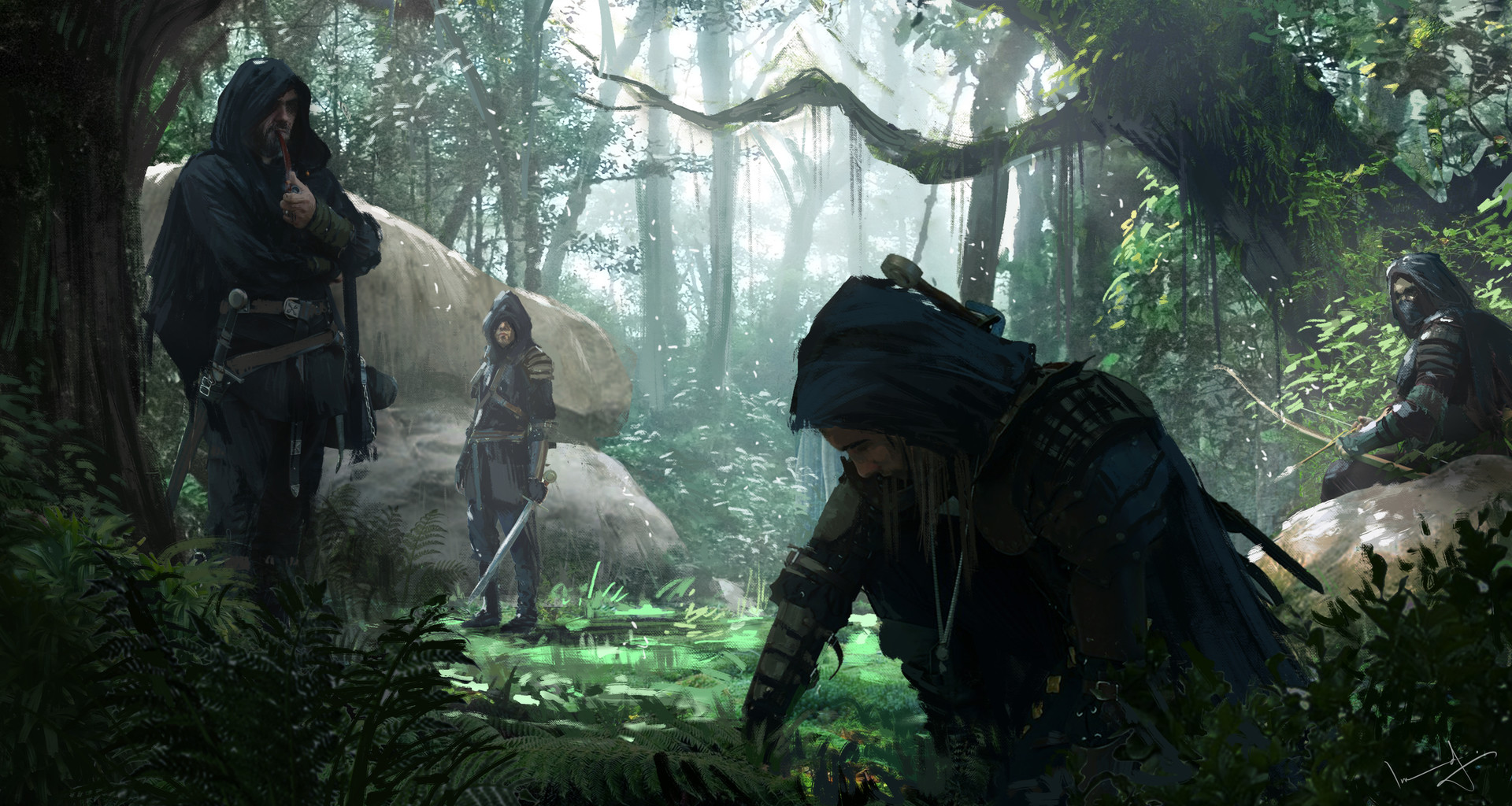



The Ranger
| Level | Proficiency Bonus |
Features | 1st | 2nd | 3rd | 4th | 5th |
|---|---|---|---|---|---|---|---|
| 1st | +2 | Survivor, Explorer | — | — | — | — | — |
| 2nd | +2 | Spellcasting, Fighting Style, Mark Prey | 2 | — | — | — | — |
| 3rd | +2 | Ranger Conclave, Vanish | 3 | — | — | — | — |
| 4th | +2 | Ability Score Improvement | 3 | — | — | — | — |
| 5th | +3 | Extra Attack | 4 | 2 | — | — | — |
| 6th | +3 | Land's Stride | 4 | 2 | — | — | — |
| 7th | +3 | Ranger Conclave Feature | 4 | 3 | — | — | — |
| 8th | +3 | Ability Score Improvement | 4 | 3 | — | — | — |
| 9th | +4 | ─ | 4 | 3 | 2 | — | — |
| 10th | +4 | Survivor Improvement | 4 | 3 | 2 | — | — |
| 11th | +4 | Ranger Conclave Feature | 4 | 3 | 3 | — | — |
| 12th | +4 | Ability Score Improvement | 4 | 3 | 3 | — | — |
| 13th | +5 | ─ | 4 | 3 | 3 | 1 | — |
| 14th | +5 | Feral Senses | 4 | 3 | 3 | 1 | — |
| 15th | +5 | Ranger Conclave Feature | 4 | 3 | 3 | 2 | — |
| 16th | +5 | Ability Score Improvement | 4 | 3 | 3 | 2 | — |
| 17th | +6 | ─ | 4 | 3 | 3 | 3 | 1 |
| 18th | +6 | Blindsight | 4 | 3 | 3 | 3 | 1 |
| 19th | +6 | Ability Score Improvement | 4 | 3 | 3 | 3 | 2 |
| 20th | +6 | Foe Slayer | 4 | 3 | 3 | 3 | 2 |
Class Features
As a ranger, you gain the following class features.
Hit Points
Hit Dice: 1d10
Hit Points at 1st Level: 10 + your Constitution modifier
Hit Points at Higher Levels: 1d10 (or 6) + your Constitution modifier per Ranger level after 1st
Proficiencies
Armor: Light armor, medium armor, shields
Weapons: Simple weapons, martial weapons
Tools: None
Saving Throws: Strength, Dexterity
Skills: Choose three from Animal Handling, Athletics, Insight, Investigation, Nature, Perception, Stealth, and Survival
Equipment
You start with the following equipment, in addition to the equipment granted by your background:
- (a) scale mail or (b) leather armor
- (a) two shortswords or (b) two simple melee weapons
- (a) a dungeoneer's pack or (b) an explorer's pack
- (a) a simple or martial ranged weapon and a container with 20 pieces of ammunition or (b) a shield
Survivor
You have learned skills to survive in harsh environments. You gain one feature of your choice from the list of Survivor features below. You gain an additional Survivor feature when you reach 10th level in this class.
Arctic Adaptation. You are naturally adapted to cold climates as described in chapter 5 of the Dungeon Master's Guide. You also gain resistance against cold damage.
Arid Adaptation. You are naturally adapted to hot climates as described in chapter 5 of the Dungeon Master's Guide. You also gain resistance against fire damage.
Aquatic Adaptation. Swimming no longer costs you extra movement. You can also hold your breath for up to 15 minutes.
Cultural Adaptation. You learn to speak, read, and write three languages of your choice. You can select this feature multiple times, choosing a different set of languages.
Grassland Adaptation. You experience the exhaustion effects of the level below your current level of exhaustion, instead of the usual effects.
Mountainous Adaptation. Climbing no longer costs you extra movement. When you fall, you can use your reaction to halve the falling damage you take.
Swampland Adaptation. You gain resistance against poison damage and you have advantage on saving throws to avoid being poisoned.
Underdark Adaptation. You gain darkvision out to a range of 60 feet. If you already have darkvision, its range increases by 30 feet instead.
Wayfarer's Adaptation. You gain proficiency with two tools of your choice between cartographer’s tools, herbalism kit, poisoner's kit, and thieves' tools.
Woodland Adaptation. You gain a +3 bonus to Wisdom (Perception) checks.








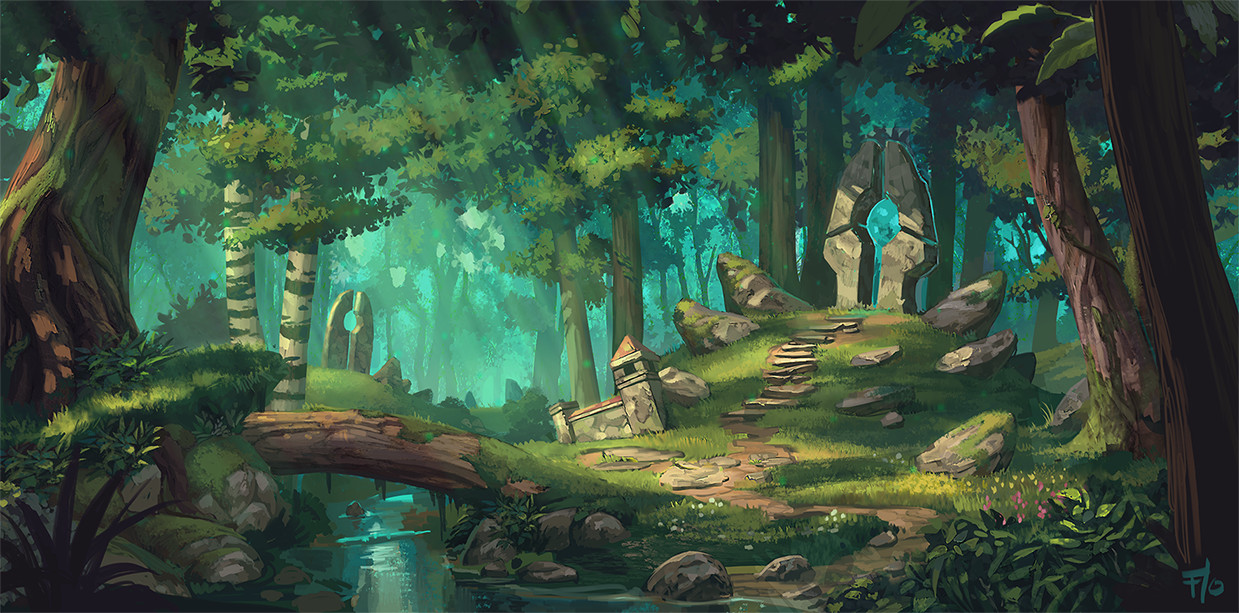






Explorer
You have vast experience with traveling through and surviving in perilous terrain, making you an apt guide for others in the untamed wilds. You gain the following benefits:
- You gain proficiency in the Survival skill. If you are already proficient in the skill, you add double your proficiency bonus to checks using it instead.
- While tracking other creatures, you also learn their exact number, their sizes, and how long ago they passed through the area.
- When you forage, you find twice as much food as you normally would.
- When traveling for an hour or more, difficult terrain doesn't slow your group's travel.
- When traveling for an hour or more, your group can travel stealthily at a normal pace.
- Your group has advantage on Wisdom (Survival) checks to avoid becoming lost by non-magical means.
- Even when you are engaged in another activity while traveling (such as foraging, navigating, or tracking), you remain alert to danger.
Spellcasting
By the time you reach 2nd level, you have learned to use the magical essence of nature to cast spells, much as a druid does. See chapter 10 of the Player’s Handbook for the general rules of spellcasting and chapter 11 for the ranger spell list.
Preparing and Casting Spells
The Ranger table shows how many spell slots you have to cast your spells of 1st level and higher. To cast one of these ranger spells, you must expend a slot of the spell's level or higher. You regain all expended spell slots when you finish a long rest.
You prepare the list of ranger spells that are available for you to cast, choosing from the ranger spell list. When you do so, choose a number of ranger spells equal to your Wisdom modifier + half your ranger level (minimum of one spell). The spells must be of a level for which you have spell slots.
For example, if you are a 5th-level ranger, you have four 1st-level and two 2nd-level spell slots. With a Wisdom of 16, your list of prepared spells can include five spells of 1st or 2nd level, in any combination. If you prepare the 1st-level spell cure wounds, you can cast it using a 1st-level or 2nd-level slot. Casting the spell doesn't remove it from your list of prepared spells.
You can also change your list of prepared spells when you finish a long rest. Preparing a new list of ranger spells requires time spent in study and focus: at least 1 minute per spell level for each spell on your list.
Spellcasting Ability
Wisdom is your spellcasting ability for your ranger spells, since your magic draws on your attunement to nature. You use your Wisdom whenever a spell refers to your spellcasting ability. In addition, you use your Wisdom modifier when setting the saving throw DC for a ranger spell you cast and when making an attack roll with one.
Spell save DC = 8 + your proficiency bonus + your Wisdom modifier.
Spell attack modifier = your proficiency bonus + your Wisdom modifier.
Fighting Style
At 2nd level, you adopt a particular style of fighting as your specialty. Choose one of the following options: Archery, Defense, Dueling, or Two-Weapon Fighting. You can't take a Fighting Style option more than once, even if you later get to choose again.
Archery
You gain a +2 bonus to attack rolls you make with ranged weapons.
Defense
While you are wearing armor, you gain a +1 bonus to AC.
Dueling
When you are wielding a melee weapon in one hand and no other weapons, you gain a +2 bonus to damage rolls with that weapon.
Two-Weapon Fighting
When you engage in two-weapon fighting, you can add your ability modifier to the damage of the second attack.
Mark Prey
Beginning at 2nd level, you know how to focus your magic onto a target to mark it as your quarry. You can cast the hunter’s mark spell innately a number of times equal to your Wisdom modifier (minimum of 1) without using a spell slot or having it prepared. If you prepare the hunter’s mark spell, you can cast it using either this feature or with a spell slot as normal. You regain all expended uses when you finish a long rest.
Ranger Conclave
At 3rd level, you choose to emulate the ideals and training of a ranger conclave from the list of available conclaves. Your choice grants you features at 3rd level and again at 7th, 11th, and 15th level. Those features include conclave spells.
Conclave Spells
Each conclave has a list of associated spells. You gain access to these spells at the levels specified in the conclave description. Once you gain access to a conclave spell, you always have it prepared. Conclave spells don't count against the number of spells you can prepare each day.
If you gain a conclave spell that doesn't appear on the ranger spell list, the spell is nonetheless a ranger spell for you.
Vanish
Starting at 3rd level, you learn hunting techniques that let you be unseen by your prey. You can use the Hide action as a bonus action on your turn. If you don't spend movement, attack, or cast a spell during the turn you use the Hide action, you can choose to gain a bonus to the Dexterity (Stealth) check you make to hide equal to your Wisdom modifier. You lose this bonus if you move, either voluntarily or because of some external effect. You are still automatically detected if any effect or action causes you to no longer be hidden.
Ability Score Improvement
When you reach 4th level, and again at 8th, 12th, 16th, and 19th level, you can increase one ability score of your choice by 2, or you can increase two ability scores of your choice by 1. As normal, you can’t increase an ability score above 20 using this feature.
Extra Attack
Beginning at 5th level, you can attack twice, instead of once, whenever you take the Attack action on your turn.
Ranger's Stride
At 6th level, your movement can keep pace with any prey. You can use the Dash action as a bonus action on your turn, and moving through difficult terrain costs you no extra movement.
Survivor Improvement
At 10th level, you choose an additional Survivor feature.
Feral Senses
Beginning at 14th level, you gain heightened senses like a beast of the wilds. You have advantage on Wisdom (Perception) checks that rely on hearing or sight.
Blindsight
At 18th level, your senses improve further, letting you use your hearing or smell to detect your surroundings. You have blindsight, meaning you can perceive your surroundings without relying on sight, out to a range of 60 feet as long as you aren’t deafened or unable to smell.
Foe Slayer
At 20th level, you become an unparalleled hunter. Once on each of your turns, you can add your Wisdom modifier to the attack and damage roll of an attack you make. You can choose to use this feature before or after the roll, but before any effects of the roll are applied.


Ranger Conclaves
While all rangers gain skill in hunting, exploration, and a blend of magic and martial skill, each ranger could have a different expression of their talents, depending on what skill they wish to master or the prey they prefer to hunt. These are represented by the conclave they choose.
The list of available conclaves in this document can be seen below, with a short description for each.
Ranger Conclaves
| Name | Description | Page |
|---|---|---|
| Beast Master | Fights alongside an animal companion that grows in skill with the ranger. | 7 |
| Bounty Hunter | Specializes in tracking and apprehending humanoids. | 9 |
| Crusader | A hunter with a hatred for fiends and the undead. | 10 |
| Giant Slayer | A slayer that goes toe to toe with huge prey. | 11 |
| Gloom Stalker | Lurks in the shadows as a master of ambush and subterfuge. | 12 |
| Herbalist | Crafts concoctions that can aid in combat or support allies. | 13 |
| Hordebreaker | Braves hordes and legions of monsters and beasts. | 14 |
| Horizon Walker | Travels the planes and specializes in hunting otherworldly entities. | 15 |
| Mageslayer | A hunter who preys upon spell-users. | 16 |
| Name | Description | Page |
|---|---|---|
| Monster Hunter | Focuses on physical prowess and finding and exploiting their mark's weaknesses. | 17 |
| Nomad | Hardened and experienced traveller who steps astride the wind. | 18 |
| Shaman | Magic adept that perfectly blends druidic magic and martial skill. | 19 |
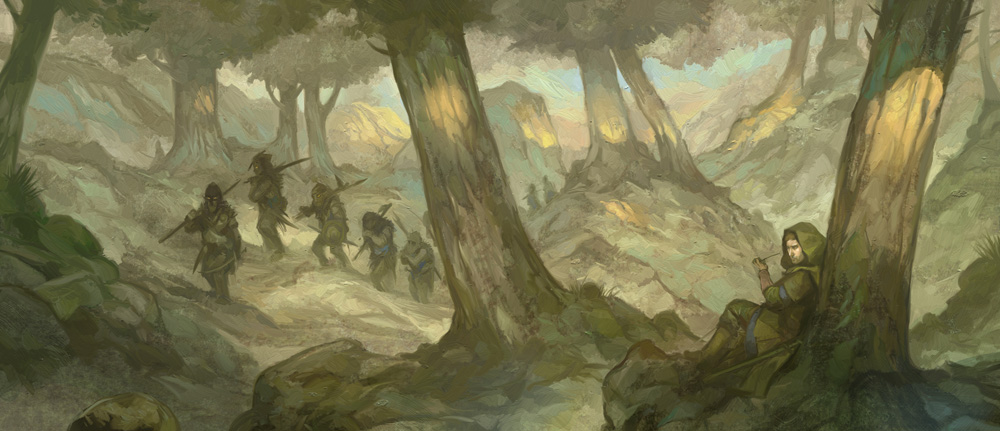



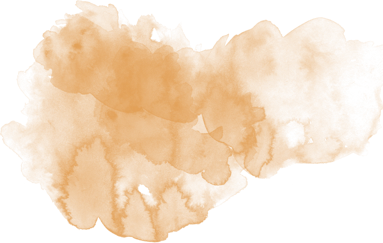








Beast Master Conclave
Many rangers are more at home in the wilds than in civilization, to the point where animals consider them kin. Rangers of the Beast Master Conclave develop a close bond with a beast, then further strengthen that bond through the use of magic.
Conclave Spells
You gain conclave spells at the ranger levels listed.
Beast Master Spells
| Ranger Level | Spell |
|---|---|
| 3rd | find familiar |
| 5th | enhance ability |
| 9th | catnap |
| 13th | dominate beast |
| 17th | awaken |
Animal Companion
At 3rd level, you learn to use your magic to create a powerful bond with a creature of the natural world.
You call forth an animal from the wilderness to serve as your faithful companion. Choose a beast that has a challenge rating of 1/2 or lower to be your animal companion. Your animal companion gains all the benefits of your Companion's Bond ability.
If your animal companion has died within the last hour, you can use your action to touch it and expend a spell slot of 1st level or higher. Your animal companion returns to life after 1 minute with all its hit points restored.
When you finish a long rest, you can call forth a different animal companion, choosing a beast that has a challenge rating of 1/2 or lower. The new animal companion appears in an unoccupied space within 5 feet of you. If you already have an animal companion from this feature, it vanishes when the new animal companion appears.
Companion's Bond
Your animal companion gains a variety of benefits while it is linked to you.
Single Attack. The animal companion loses its Multiattack action, if it has one. Your companion's attacks count as magical for the purpose of overcoming resistance and immunity to nonmagical attacks and damage.
Companion's Intuition. While you and your companion are within 5 miles of each other, your bond lets either of you know the other's direction and distance from them (in miles), and if the other's current hit points are at 0.
Actions in Combat. The companion obeys your commands as best it can. It shares your initiative, but you can choose if you or your companion takes their turn first each round. You determine your companion's actions, decisions, attitudes, and so on. Your companion can't use its action to make attacks until you command it to, but it can move and take other actions and reactions as normal. If you are incapacitated or absent, your companion acts on its own.
Attacks in Combat. You can use a bonus action on your turn to command your companion to attack a target that you can see. Your companion can use its action to attack that target until it or your companion dies, you call off your companion (no action required), or you use a bonus action on your turn to command your companion to attack a different target.
Attack Modifier. The attack modifier of your companion's weapon attacks is equal to the attack's normal modifier or your ranger spell attack modifier, whichever is higher.
Saving Throw DC. If an ability, attack, or feature of your companion involves forcing a target to make a saving throw, the saving throw DC is equal to the normal DC or your ranger spell save DC, whichever is higher.
Ability Bonuses. Your animal companion has abilities and game statistics determined in part by your Wisdom modifier. Your animal companion can add your Wisdom modifier to its AC, saving throws, and skills checks.
When you reach 11th level in this class, your companion can also add your Wisdom modifier to the damage rolls of its weapon attacks.
Maximum Hit Points & Hit Dice. Your animal companion's hit point maximum is equal to its normal maximum or 5 x your ranger level, whichever is higher. It also has a number of d8 hit dice equal to your ranger level, which it can spend during a short rest.
Shared Features. Your animal companion gains the benefits of your Feral Senses feature at 14th level in this class and your Blindsight feature at 18th level in this class.
Personality. You determine your companion's traits, flaws, ideals, bonds, and alignment.
Peerless Teamwork
Beginning at 11th level, you and your animal companion master hunting as one coordinated unit. When you or your companion hits a creature with a weapon attack, until the start of the attacker’s next turn, the other can roll a d6 and add the result to its next weapon attack roll against the same creature. Both you and your companion can each impart this benefit to the other once per round.


Bounty Hunter Conclave
Some rangers use their skills to track down and apprehend criminals or fugitives. These rangers may be detectives fighting the good fight, or mercenaries in it for the coin - but those who choose to specialize in hunting humanoids choose the Bounty Hunter Conclave. Bounty hunters excel at locating and apprehending their enemies, especially those who thrive in the shadows of urban environments. In order to survive their dangerous their line of work, a bounty hunter's sense of perception and skills at investigating have developed to be razor sharp.
Conclave Spells
You gain conclave spells at the ranger levels listed.
Bounty Hunter Spells
| Ranger Level | Spell |
|---|---|
| 3rd | disguise self |
| 5th | hold person |
| 9th | tongues |
| 13th | locate creature |
| 17th | passwall |
Investigator
At 3rd level, you gain proficiency in the Investigation skill. If you are already proficient in the skill, you add double your proficiency bonus to checks using it instead. When speaking with humanoids, you have advantage on any Wisdom (Insight) checks you make to determine their motives or detect lies.
Disarming Strike
At 3rd level, when you hit a creature with a weapon attack, you can attempt to disarm the target, forcing it to drop one item of your choice that it's holding, or release a creature it is grappling. If you do, the target takes an additional 1d8 damage, and must make a Strength saving throw against your ranger spell save DC. On a failed save, it drops the object, which lands at its feet, or releases the grapple. You can use this feature a number of times equal to your Wisdom modifier (minimum of once). You regain expended uses on a short or long rest.
Heightened Awareness
At 7th level, your senses become attuned to the presence of others. As long as you aren’t blinded or deafened, creatures within 10 feet of you can’t be hidden from you, and you can’t be surprised.
Press the Attack
At 11th level, the power or finesse behind your attacks leaves your target vulnerable, giving you an opportunity to strike again. When you take the Attack action and hit with two weapon attacks against one target, you can make an additional weapon attack against the same target as part of the same action.
Escape Artist
At 15th level, you know how to make a quick getaway when things are going south. You no longer provoke opportunity attacks. You can also spend half your movement to automatically escape from nonmagical restraints, such as manacles or a creature that is grappling you.
Crusader Conclave
Where paladins are holy defenders, crusaders prefer the offensive, taking the fight to the fiends themselves. Crusaders are often seen traversing through Abyss-infected badlands to close otherworldly portals, or sneaking past hordes of undead to kill their reanimator. Those in this conclave follow no oaths, but instead find strength in their ire against creatures of unnatural origin. Crusaders typically work in service of a church or deity, though those in the employ of evil forces prefer to hunt agents of good instead.
Conclave Spells
You gain conclave spells at the ranger levels listed.
Crusader Spells
| Ranger Level | Spell |
|---|---|
| 3rd | detect evil and good |
| 5th | branding smite |
| 9th | magic circle |
| 13th | death ward |
| 17th | banishing smite |
Divine Ire
At 3rd level, you can channel the strength of your ire into one attack that strikes fear into the heart of your enemies. When you hit a creature with a weapon attack, you can deal an additional 2d6 radiant or necrotic damage (your choice when you gain this feature). The target must also make a Wisdom saving throw against your spell save DC or be frightened of you for 1 minute or until it takes any damage. If your target is a celestial, fiend, shapechanger, or undead, it takes an additional 1d6 damage of the chosen type and has disadvantage on the saving throw. Once you use this feature, you can't use it again until you finish a short or long rest.
Crusader’s Knowledge
At 3rd level, you’ve studied your prey thoroughly, learning everything you can about them to gain any advantage you can get. You learn to speak, read, and write Celestial, Abyssal, Infernal, or Undercommon. You have advantage on Wisdom (Survival) checks to track celestials, fiends, shapechangers, and undead, as well as on Intelligence checks to recall information about them.
Steel Will
At 7th level, your experiences against otherworldly horrors have left your psyche scarred, but resolute. You can’t be frightened or possessed.
Heaven’s Hunter
At 11th level, your weapon attacks count as magical for the purpose of overcoming resistance and immunity to nonmagical attacks and damage, and deal an additional 1d4 radiant or necrotic damage (your choice when you gain this feature).
Sacred Resistance
Starting at 15th level, a higher power safeguards your fate. When you fail a saving throw, you can choose to succeed instead. Once you use this feature, you must finish a long rest before you can use it again.







Giant Slayer Conclave
Giant Slayers take down marks two, three, even ten times their size. They use their smaller stature to their advantage, weaving in and out of lumbering attacks, climbing onto massive creatures to reach their mark, and dashing under their huge prey between their legs. Trolls and ogres, and even dragons and giants fall prey to their cunning. Through daring and sheer grit, they make even the largest of predators seem like just another kill.
Conclave Spells
You gain conclave spells at the ranger levels listed.
Giant Slayer Spells
| Ranger Level | Spell |
|---|---|
| 3rd | heroism |
| 5th | earthbind |
| 9th | slow |
| 13th | staggering smite |
| 17th | hold monster |
The Bigger They Are
At 3rd level, you can make strikes that use an enemy's size against them. When you hit a creature with a weapon attack, you can attempt to knock the target prone. If you do, the target must make a Strength saving throw against your ranger spell save DC. On a failed save, it is knocked prone. A creature knocked prone using this feature takes 1d8 damage if its size is Medium, or 2d8 damage if it is Large or larger. You can use this feature a number of times equal to your Wisdom modifier (minimum of once). You regain expended uses on a short or long rest.
Colossus Slayer
At 3rd level, you've learned techniques that let you hunt prey bigger than you. You can move through the space of any creature that is of a size larger than yours. Climbing no longer costs you extra movement.
Infectious Bravery
At 7th level, your resolve has been steeled by constantly fighting against foes that tower over you. You can't be frightened. You can use your action to end one effect on a creature within 5 feet of you that is causing it to be frightened. When you do, you can't do so again until you finish a short or long rest.
Take Opening
At 11th level, battling against huge, lumbering enemies have taught you how to strike when your enemies are most vulnerable. After a creature you can see makes an attack that does not hit you, you can use your reaction to move up to half your speed towards the creature and make one weapon attack against it. If you move, you cannot end your movement further from the creature than where you started.
Between the Legs
At 15th level, you can weave in and out of an enemy's reach, using their own body against them. The first attack against you each round made by a creature you can see within 5 feet of you has disadvantage.
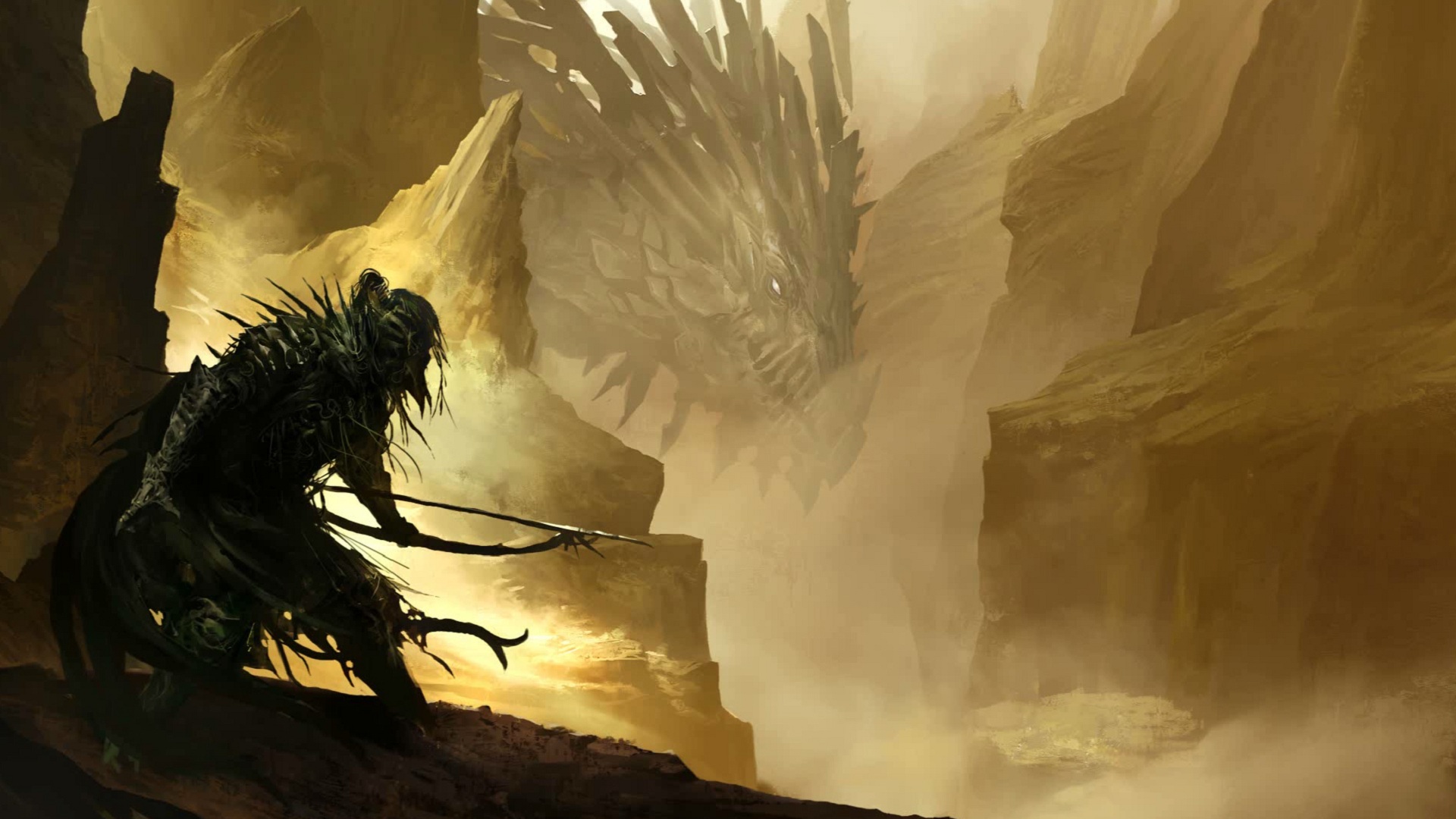




Gloom Stalker Conclave
Gloom Stalkers are at home in the darkest places: deep under the earth, in gloomy alleyways, in primeval forests, and wherever else the light dims. Most folk enter such places with trepidation, but a Gloom Stalker ventures boldly into the darkness, seeking to ambush threats before they can reach the broader world. Such rangers are often found in the Underdark, but they will go any place where evil lurks in the shadows.
Conclave Spells
You gain conclave spells at the ranger levels listed.
Gloom Stalker Spells
| Ranger Level | Spell |
|---|---|
| 3rd | bane |
| 5th | rope trick |
| 9th | fear |
| 13th | greater invisibility |
| 17th | seeming |
Dread Ambusher
At 3rd level, you master the art of the ambush. You can give yourself a bonus to your initiative rolls equal to your Wisdom modifier.
Also, if you take the Attack action on your first turn of each combat, you can make one additional weapon attack as part of that action.
Umbral Sight
At 3rd level, you gain darkvision out to a range of 60 feet. If you already have darkvision, its range increases by 30 feet.
You are also adept at evading creatures that rely on darkvision. While in darkness, you are invisible to any creature that relies on darkvision to see you in that darkness.
Iron Mind
By 7th level, you have honed your ability to resist the mind-altering powers of your prey. You gain proficiency in Wisdom saving throws. If you already have this proficiency, you instead gain proficiency in Intelligence or Charisma saving throws (your choice).
Stalker’s Flurry
At 11th level, you learn to attack with such unexpected speed that you can turn a miss into another strike. Once on each of your turns when you miss with a weapon attack, you can make another weapon attack as part of the same action.
Shadowy Dodge
Starting at 15th level, you can dodge in unforeseen ways, with wisps of supernatural shadow around you. Whenever a creature makes an attack roll against you and doesn't have advantage on the roll, you can use your reaction to impose disadvantage on it. You must use this feature before you know the outcome of the attack roll.


























Herbalist Conclave
Herbalists have learned to extract the magical properties of plants and nature in order to create potent mixtures that can aid allies and injure foes.
Conclave Spells
You gain the conclave spells at the ranger levels listed.
Herbalist Spells
| Ranger Level | Spell |
|---|---|
| 3rd | purify food and drink |
| 5th | aid |
| 9th | stinking cloud |
| 13th | blight |
| 17th | greater restoration |
Alchemist
At 3rd level, you gain proficiency with herbalism kits and you add double your proficiency bonus for any ability check you make using it. Also, the gold and time you must spend to create antitoxins and potions using an herbalism kit is halved.
Volatile Mixtures
At 3rd level, as long as you have an herbalism kit, at the end of a long rest, you can prepare up to five mixtures, chosen from the list below, in any combination. For example, you can prepare three healing draughts and two quick coatings at the end of a long rest.
It is assumed that your mixtures are created from ingredients foraged or gathered while traveling. Your mixtures lose their potency after 24 hours.
Some mixtures require a target to make a saving throw to resist the mixture's effects. The saving throw DC is your ranger spell save DC.
List of Mixtures
The options for your Volatile Mixtures feature are presented here.
Healing Draught. This draught takes an action to drink or administer to another creature. A creature that drinks this draught regains 1d6 hit points. This draught has no effect on undead or constructs.
The healing increases to 2d6 when you reach 11th level.
Restorative Draught. This draught takes an action to drink or administer to another creature. Creatures that drink this draught is cured of either one disease or one condition afflicting it. The condition can be blinded, deafened, paralyzed, or poisoned. This draught has no effect on undead or constructs.
Quick Coating. As a bonus action on your turn, you can coat one melee weapon or up to ten pieces of ammunition with a reactive alchemical mixture. Once applied, the coating loses its potency at the start of your next turn.
A coated weapon or piece of ammunition deals an additional 1d6 damage. The damage type is acid or poison (your choice).
The additional damage increases to 1d10 when you reach 11th level.
Poison Bomb. As an action, you can throw this flask to a point up to 20 feet from you, shattering it on impact, releasing a small cloud of poison that disperses quickly. Each creature in a 5-foot-radius sphere centered on the point of impact must make a Constitution saving throw or take 1d4 poison damage and become poisoned for one minute. The creature can repeat the saving throw at the end of each of its turns, ending the condition on itself on a success.
The damage increases by 1d4 when you reach 5th level (2d4), 11th level (3d4), and 17th level (4d4).
Smoke Bomb. As an action, you can throw this flask to a point up to 20 feet from you, shattering it on impact. It creates a 5-foot-radius sphere of smoke centered on the point of impact. The sphere spreads around corners, and its area is heavily obscured. It lasts for one minute or until winds (at least 5 miles per hour) disperse it.
Sludge Bomb. As an action, you can throw this flask to a point up to 20 feet from you, shattering it on impact. The ground in a 5-foot-radius centered on that point becomes difficult terrain for one minute.
Natural Resistance
At 7th level, due to repeated exposure to alchemical mixtures and poisons, your body’s natural resistances have increased. You gain proficiency in Constitution saving throws.
Efficient Mixing
At 11th level, the number of mixtures you can prepare at the end of each long rest is 5 + your Wisdom modifier (minimum of 5).
Master Alchemist
At 15th level, you have mastered your mixtures’ recipes, and have learned to combine your ingredients to deadly effectiveness. Your mixtures gain additional effects:
Healing Draught. You can add your Wisdom modifier to the amount of hit points the draught restores.
Restorative Draught. In addition to curing one disease or condition, the mixture also reduces the target's exhaustion level by one.
Quick Coating. When you roll damage for the quick coating, you can treat a roll of 1 or 2 on a damage die as a 3.
Poison Bomb. A creature who succeeds on the saving throw takes half the damage instead of no damage.
Smoke Bomb. The smoke's radius increases to 10 feet, and it lasts for up to 10 minutes. Winds can no longer disperse the smoke.
Sludge Bomb. When a Large or smaller creature enters the sludge’s area for the first time on a turn or starts its turn there, that creature must make a Strength saving throw. On a failed save, the creature's speed becomes 0 until the start of its next turn.
Hordebreaker Conclave
A woodsman, braving stampedes of beasts in the wilderness; a hunter, slaying hordes of monsters in their own lair; a skirmisher fighting through legions of soldiers to break through the line. Hordebreakers are at home in the thick of the fray - outnumbered, but not outmatched.
Conclave Spells
You gain conclave spells at the ranger levels listed.
Hordebreaker Spells
| Ranger Level | Spell |
|---|---|
| 3rd | grease |
| 5th | web |
| 9th | enemies abound |
| 13th | confusion |
| 17th | wall of stone |
Hordebreaker
At 3rd level, you fight fiercer when you are outnumbered. Once on each of your turns when you make a weapon attack, you can make another attack with the same weapon against a different creature that is within 5 feet of the original target and within range of your weapon.
Escape the Horde
At 3rd level, opportunity attacks against you are made with disadvantage.
Brave the Stampede
At 7th level, when you take damage, you gain a bonus to your AC equal to your Wisdom modifier (minimum of one) against attacks from creatures you can see until the start of your next turn.
Multiattack
At 11th level, you gain one of the following features of your choice.
Volley. When you take the Attack action, instead of making your normal number of attacks, you can make a ranged attack against any number of creatures within 10 feet of a point you can see within your weapon's range. You must have ammunition for each target, as normal, and you make a separate attack roll for each target.
Whirlwind Attack. When you take the Attack action, instead of making your normal number of attacks, you can make one melee weapon attack against each creature within 10 feet of you, with a separate attack roll for each target.
Stand Against the Tide
At 15th level, when a hostile creature misses you with a melee attack, you can use your reaction to force that creature to repeat the same attack against another creature (other than itself) of your choice.



















Horizon Walker Conclave
Horizon Walkers guard the world against threats that originate from other planes or that seek to ravage the mortal realm with otherworldly magic. They seek out planar portals and keep watch over them, venturing to the Inner Planes and the Outer Planes as needed to pursue their foes. These rangers are also friends to any forces in the multiverse—especially benevolent dragons, fey, and elementals—that work to preserve life and the order of the planes.
Conclave Spells
You gain conclave spells at the ranger levels listed.
Horizon Walker Spells
| Ranger Level | Spell |
|---|---|
| 3rd | protection from evil and good |
| 5th | misty step |
| 9th | haste |
| 13th | banishment |
| 17th | teleportation circle |
Planar Traveler
At 3rd level, you gain the ability to magically sense the presence of planar portals. As an action, you detect the distance and direction to the closest planar portal within 5 miles of you. Once you use this feature, you can't use it again until you finish a short or long rest. When you reach 15th level in this class, instead of detecting a portal, once per day you can cast the plane shift spell, but only as a ritual.
Horizon Warrior
At 3rd level, you learn to direct the energies of the multiverse to weaken your foes’ tethers to the plane. As a bonus action, you designate one creature you can see within 60 feet of you as the target of this feature. The first time each turn that you hit that target with a weapon attack, it takes an extra 1d6 force damage. If the creature is not on its plane of origin, it takes an extra 1d10 force damage instead.
This benefit lasts until you finish a short or long rest. It ends early if you designate a different creature.
Ethereal Step
At 7th level, you learn to step through the Ethereal Plane. As a bonus action, you can cast the etherealness spell with this feature, without expending a spell slot, but the spell ends at the end of the current turn.
Once you use this feature, you can't use it again until you finish a short or long rest.
Distant Strike
At 11th level, you gain the ability to pass between the planes in the blink of an eye. When you take the Attack action, you can teleport up to 10 feet before each attack to an unoccupied space you can see.
If you attack at least two different creatures with the action, you can make one additional attack with it against a third creature.
Spectral Defense
At 15th level, your ability to move between planes enables you to slip through the planar boundaries to lessen the harm done to you during battle. When you take damage, you can use your reaction to give yourself resistance to that instance of damage.
Mageslayer Conclave
The mageslayer is a hunter specializing in finding and fighting magic-users. A mageslayer could be one born into a culture of fearing and vilifying arcane magic, a knight striving to defeat masters of the occult who plague the innocent, or a bounty hunter who people know to hire when they have a wizard problem. Whatever their origin, those who choose the mageslayer's conclave learn to defend against a spell-user's arcane assaults and disable their defenses to secure the kill.
Conclave Spells
You gain conclave spells at the ranger levels listed.
Mageslayer Spells
| Ranger Level | Spell |
|---|---|
| 3rd | identify |
| 5th | see invisibility |
| 9th | dispel magic |
| 13th | aura of purity |
| 17th | circle of power |
Addling Strike
At 3rd level, you learn to aim for a mage's spellcasting focus, or a magical creature's vital source of power to temporarily disable their magic. When you hit a creature with a weapon attack, you can choose to deal an additional 2d4 damage. If you do, the target can't cast spells or teleport until the start of your next turn. Once you use this feature, you can’t use it again until you finish a short or long rest.
Spellsight
At 3rd level, you grow sensitive to the presence of magical illusions and hazards. You have advantage on skill checks and saving throws to detect or resist visual illusions and magical traps, such as a glyph of warding or symbol spell.
Antimagic Mask
By 7th level, your mind becomes resistant to becoming magically addled. You can't be charmed.
Disruptive Counter
At 11th level, you can swiftly attack an enemy to foil their attempt to harm you. When a creature you can see forces you to make a saving throw, you can use your reaction to make one weapon attack against that creature. You make this attack immediately before making the saving throw. If your attack hits, your save automatically succeeds, in addition to the attack's normal effects.
Countercurse Mantra
At 15th level, you learn techniques that let you cleanse yourself of harmful magic. You can end one spell or magical effect on yourself as an action.
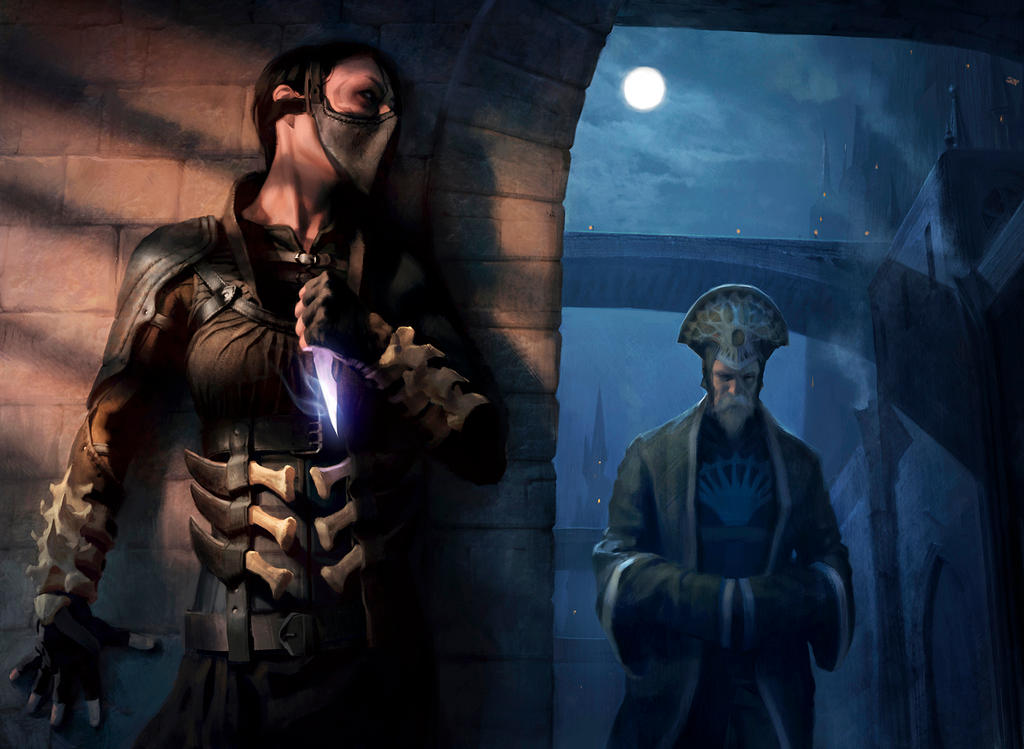



















Monster Hunter Conclave
There are many reasons a ranger will take on the mantle of a Monster Hunter: they may have accepted their role as the barrier between civilization and wild monsters, they may enjoy the abundant rewards that hunting rare but deadly beasts and monstrosities bring, but many hunters simply live for the thrill of the hunt. Monster Hunters are fierce predators that have mastered pinpointing and taking advantage of their foes’ weaknesses to bring them down.
Conclave Spells
You gain conclave spells at the ranger levels listed.
Monster Hunter Spells
| Ranger Level | Spell |
|---|---|
| 3rd | faerie fire |
| 5th | invisibility |
| 9th | slow |
| 13th | locate creature |
| 17th | hold monster |
Weakness Exploit
At 3rd level, you intuitively know where to strike to take advantage of your foes’ weaknesses. When you hit a creature with a weapon attack, the creature takes an extra 1d8 damage if it's below its hit point maximum. You can deal this extra damage only once per turn.
Know Your Prey
At 3rd level, you gain the ability to size up your prey through observation. If you spend at least 1 minute observing or interacting with another creature, you learn whether the creature has any damage immunities, resistances, or vulnerabilities.
Adrenaline
At 7th level, when you take damage, you gain a bonus to your AC equal to your Wisdom modifier (minimum of one) against attacks from creatures you can see until the start of your next turn.
Take Opening
At 11th level, you know to strike when your enemies are most vulnerable. After a creature you can see makes an attack that does not hit you, you can use your reaction to move up to half your speed towards the creature and make one weapon attack against it. If you move, you cannot end your movement further from the creature than where you started.
Hunter’s Durability
At 15th level, hunting creatures stronger than you has honed your body’s physical defences. When you make a Strength, Dexterity, Constitution, or death saving throw, you can roll a d8 and add the result to your save.
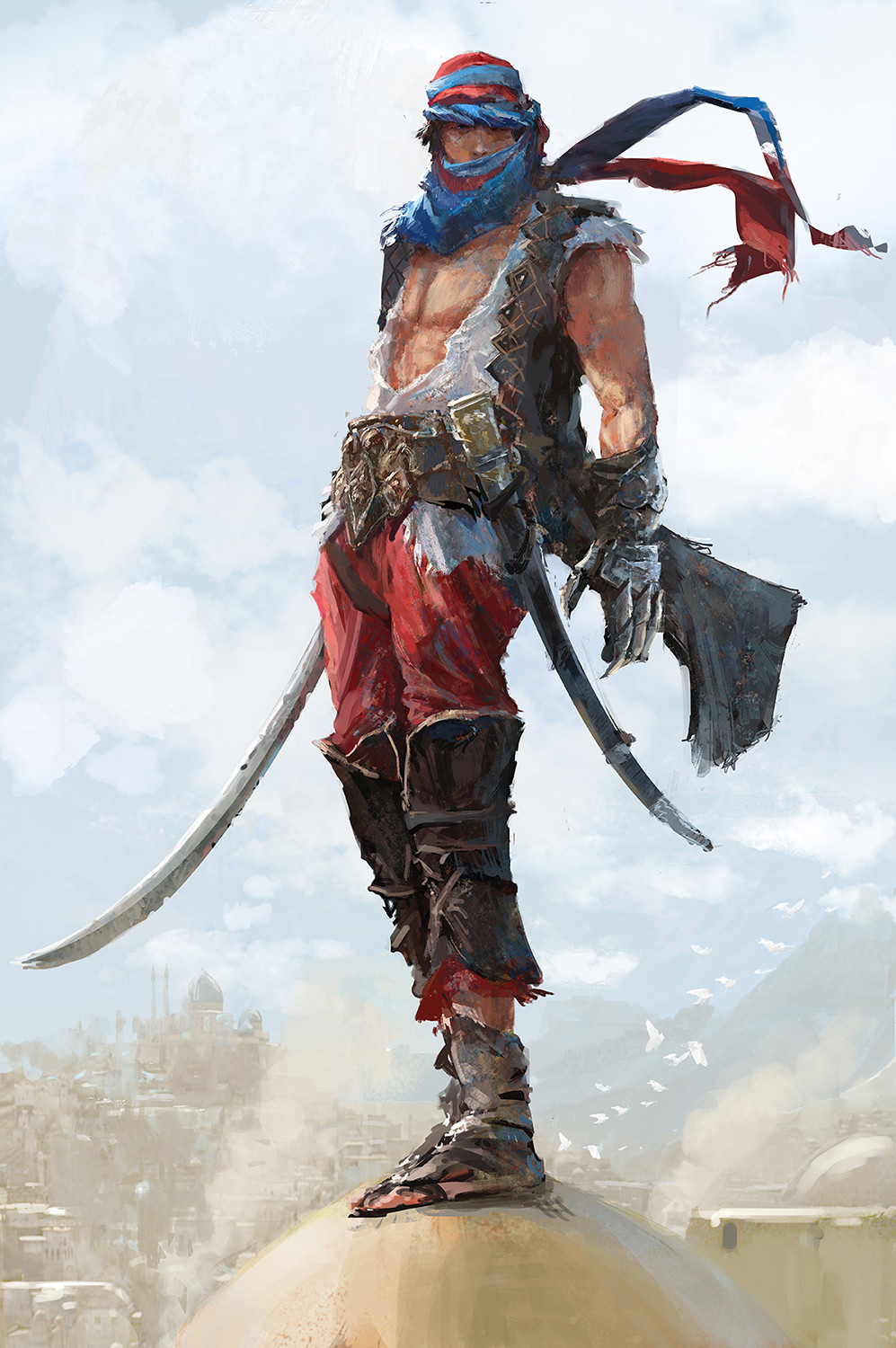



Nomadic Conclave
Some rangers are tireless wanderers, with a hunger for exploring the world and traveling to new places. Explorers who take to the Nomad Conclave are hardened adventurers who have no true home, always on the move towards distant lands and exotic locations.
Conclave Spells
You gain the conclave spells at the ranger levels listed.
Nomadic Spells
| Ranger Level | Spell |
|---|---|
| 3rd | feather fall |
| 5th | misty step |
| 9th | fly |
| 13th | dimension door |
| 17th | far step |
Wanderer
At 3rd level, you have learned much from your journeys, and your familiarity with nature makes you adept at traveling and surviving in different regions. You gain an additional Survivor feature at 3rd level, and again at 15th level.
Additionally, when traveling for an hour or more, your group can travel at a fast pace without a penalty to your Wisdom (Perception) scores.
Speed of the Wind
Starting at 3rd level, the winds you travel with augment your movements. You gain the following benefits:
- You can take the Disengage action as a bonus action on your turn.
- While you are not wearing heavy armor, your base walking speed is increased by 10 feet.
Escapist
At 7th level, you learn to dance around your opponent's attacks to move gracefully across the battlefield. After a creature hits or misses you with an attack, you can use your reaction to move up to half your speed. Opportunity attacks triggered by this movement are made with disadvantage.
Wind Blades
At 11th level, your attacks are empowered by the wind itself. When you take the Attack action to make a weapon attack, you can deal an additional 1d6 magical slashing damage to your target whether you hit or miss, as the winds your attack leaves in its wake slice at your foe. You can deal this extra damage only once per round.
Windrunner
At 15th level, you always have the wind at your back. When you take the Disengage or Dodge action, you also gain the benefits of the Dash action.



Shamanic Conclave
Some rangers attempt to attune further with the magic of the wilds. They learn to harness the raw magic at work in the world and use it to protect the wilderness from those who would threaten it. Some shamans use their magic to bring harmony between civilization and the wilderness, while others see themselves fully as extensions of nature, as much part of it as the trees of the forest or the beasts within.
Conclave Spells
You gain the conclave spells at the ranger levels listed.
Shamanic Spells
| Ranger Level | Spell |
|---|---|
| 3rd | entangle |
| 5th | flaming sphere |
| 9th | erupting earth |
| 13th | control water |
| 17th | control winds |
Shamanic Spellcasting
Beginning at 3rd level, you gain the ability to attune to and harness the magic of nature deeper than most rangers. When you prepare your ranger spells when you finish a long rest, you can prepare a number of spells equal to your Wisdom modifier (minimum of one) from the druid spell list instead of the ranger spell list. As normal, each spell must be of a level for which you have spell slots. The spells count as ranger spells for you as long as you have them prepared. Additionally, your mastery of primal magic improves:
Cantrips. You learn two cantrips of your choice from the druid spell list. You learn an additional druid cantrip of your choice at 10th level. These cantrips count as ranger spells for you.
Ritual Casting. You can cast any ranger spell as a ritual if that spell has the ritual tag and you have the spell prepared.
Shamanic Focus
At 3rd level, your attunement to druidic practices combined with your knowledge of ranger lore lets you imbue a wooden weapon with natural magic to create a spellcasting focus only you can use. You can conduct a ritual on a wooden club, quarterstaff, or shortbow. The ritual takes place over the course of one hour or a short rest. The weapon must be within your reach throughout the ritual. At the end of the ritual, you instil the weapon with your magic. You can use it as a spellcasting focus for your ranger spells, and the weapon becomes magical, if it isn’t already. You can perform the somatic components of spells with your shamanic focus if you are holding it.
You can have only one shamanic focus at a time. Performing the ritual on a second weapon will end the magic affecting the previous one.
As an action, you can expend a ranger spell slot to have your shamanic focus grow piercing thorns which last for one hour. When you hit with your shamanic focus while it is thorned, the target takes an extra 1d4 piercing damage.
Primal Wisdom
At 7th level, the spirits of nature lend you their guidance. You gain proficiency in Wisdom saving throws. If you already have this proficiency, you instead gain proficiency in Intelligence or Charisma saving throws (your choice).
Nature’s Fury
At 11th level, your mastery over both the martial and magical aspects of ranger lore lets you seamlessly shift between both in battle. When you take the Attack action on your turn, you can replace one of your attacks and instead cast a ranger spell with a casting time of one action. The spell must be a cantrip or a 1st-level spell.
Forest’s Fortitude
At 15th level, your body’s link to the energies of nature lets you shrug off blows easier in battle. When you take damage, you can use your reaction to gain a number of temporary hit points equal to twice your Wisdom modifier (minimum of 2).
Variant Rules
Using the PHB or UA Ranger with the Homebrew Conclaves
If you want to use the PHB Ranger with the new subclasses, I have adjusted all of them accordingly in this document.
Shamanic Conclave: Variant Shamanic Foci
The weapon types that the Shaman’s focus can affect was done for balance and thematic reasons. Allowing reflavoured daggers or shortswords (or other weapons with a 1d6 or lower damage die) as wooden tonfas or batons will not imbalance the class.
As a special reward, your DM might decide to allow you to turn a different weapon type other than a club, quarterstaff, or shortbow into your shamanic focus, as long as they are wooden. This may involve finding a craftsman specialized in creating wooden weapons out of difficult to obtain magical materials, learning how to craft them yourself through finding and studying a lost ancient crafting technique, or simply finding wooden variants of weapons as loot on your adventures. Acquiring such weapons may be quests by themselves. For example, you might find a wood-elf shaman deep in the fey forests that knows how to create a wooden longsword or glaive using magical wood that is as strong as metal!
New Ranger Spell
Primeval Awareness
3rd-level divination
- Casting Time: 1 action
- Range: Self
- Components: S
- Duration: Concentration, up to 1 minute
For the duration of the spell, you can sense whether the following types of creatures are present within 5 miles of you: aberrations, celestials, dragons, elementals, fey, fiends, and undead. This feature reveals a group of one or more creatures and their group's general direction in relation to you, but not their exact numbers or distance. If there are multiple groups of creatures within the spell's range, you learn this information for each group.
At Higher Levels. When you cast this spell using a spell slot of 4th level or higher, the duration is increased to 1 hour. When you cast this spell using a spell slot of 5th level or higher, you can sense creatures within 10 miles of you.
- Classes: Ranger
Art Credits
Art credits arranged by appearance. If any of the artists would like their work to be taken down from the live version of this document, please feel free to message me on reddit (/u/regularabsentee). I will happily remove it for you.
- "stickman salesman" by HeavenlyDeamonic
- "Rangers from the North" by Imad Awan
- Ranger Grove by Alexandra Schastlivaya, commissioned by /u/Ashl3yb33
- "Druid Forest" by Florian Dreyer
- "Rangers" by Jon Hodgson
- Beast Master with Wolf by Ivan Vilmant
- "Through the Eyes of a Friend" by Jan-Philipp Eckert
- Arannis by cha4os, commissioned by /u/TannerThanUsual
- I can't find the original of the art used for the Giant Slayer conclave. If you know the artist, let me know so I can properly credit!
- "Vagabond" by dongho kang
- "Test" by Link Chen
- “Pei Zin Herbalist” by ALRadeck
- “Dinosaur Stampede” by Bram Sels
- “Demon Hunter” by crow-god
- "Assassin's Strike" by chasestone
- "Lagertha Lothbrok" by Nuare Studio
- "Prince of Persia fanart" by Kobe Sek
- “Barceline - Grimslingers Art” by SteveGibson
